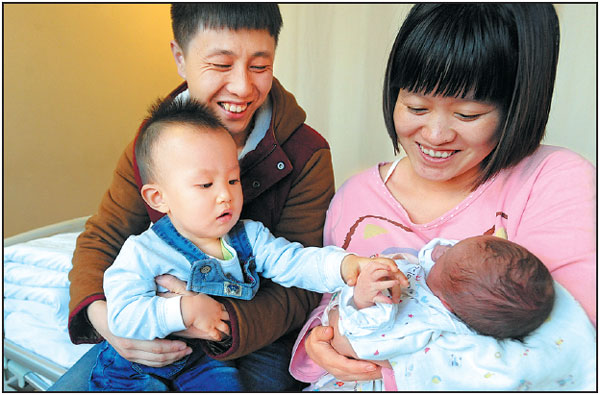Liaoning policies encourage couples to have more children
By Wu Yong in Shenyang and Wang Xiaodong in Beijing | China Daily | Updated: 2018-07-10 08:51

The government of Liaoning province is considering policies to relieve the financial burdens of couples who have had a second child. The policies are designed to encourage births and thereby help overcome China's major demographic challenges - aging and a dwindling workforce.
The provincial government said it will help families who have chosen to give birth by providing benefits in taxes, education, social security and housing. It will also explore other policies to ease the daily burden of raising children, it said in a guideline released last week.
Other steps will be taken to encourage more couples to have a second child, including providing longer maternity leaves and encouraging employers to allow flexible work hours for pregnant women and nursing mothers, the guideline said.
Details are still being studied, according to the Liaoning Development and Reform Commission.
The guideline was released as the workforce has dwindled in the province and the average age has risen over the past few years. Those factors are having negative effects on social and economic development, the government said.
With China's adoption of the universal second-child policy at the beginning of 2016, the provincial government has set a target of steady population growth from around 44 million in 2015 to 45 million by 2030, according to the commission. That would represent a significant reversal: The population of the province has been declining since 2014.
"To achieve the growth target, the government will try every means to encourage births, so society can shift its concept as quickly as possible from one child to two," the commission said.
The government will also intensify training of local talent and import more from other areas to improve the quantity and quality of the workforce, it said.
The number of people aged 60 or above in Liaoning province reached 9.6 million at the end of last year, accounting for more than 22.6 percent of its population - far above the national average of 17.3 percent - according to a report by the Liaoning Working Committee on Aging.
After a nationwide increase of 1.3 million in the number of new births year-on-year in 2016 - the first year the universal second-child policy was carried out - births fell by 3.5 percent last year on the Chinese mainland to 17.23 million. The National Health Commission attributed the decline to factors such as a drop in the number of women of childbearing age and reluctance to have a second child.
A survey organized by the commission showed more than 82 percent of couples said the major reason for not having a second child was the financial burden, said Yang Wenzhuang, an official with the commission. Another reason often cited was that they didn't have time to care for a second child.
The commission will introduce more measures to encourage births and is working with various ministries to create policies favorable to childbearing couples, it said.
























